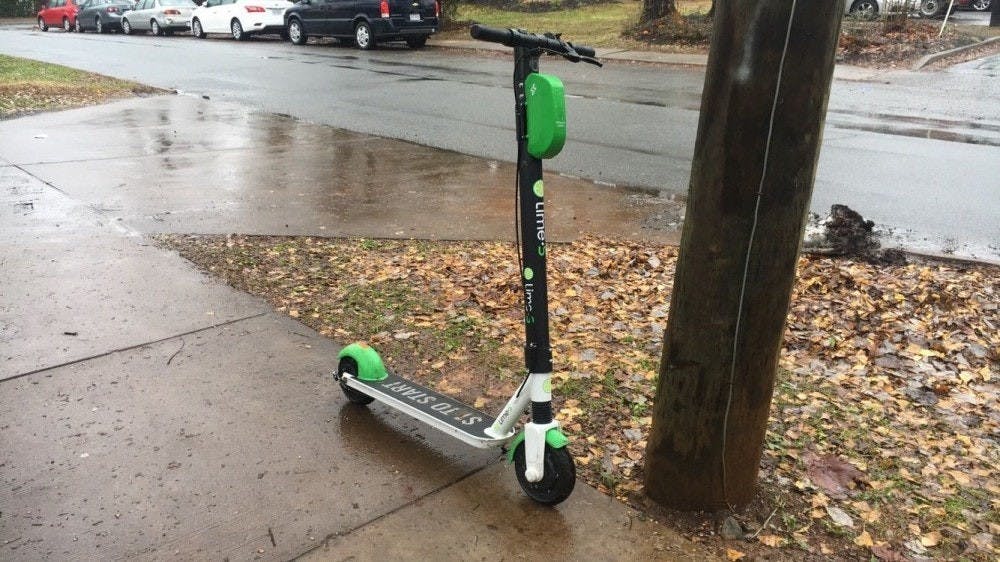Electric vehicle safety has become particularly relevant to the University in recent months, especially after Lime and Bird — two dockless scooter companies — were launched in the City of Charlottesville. Although pedestrians and bicyclists constitute a significant percentage of accidents, vehicles such as segways, electric scooters and skateboards are also clearly part of the equation. This reality is exemplified by the recent increase in emergency room visits by users of these dockless scooter companies in several cities across the United States. Given that these accidents are occurring at an alarming rate, individuals need to be able to receive damages based on their level of fault. Unfortunately, in Virginia, this process is far too stringent.
In the aftermath of an automobile accident, the injured party — pedestrian, bicyclist or operator of a non-motorized vehicle — will generally seek compensatory damages from the defendant. However, Virginia’s pure contributory negligence laws for automobile accidents state that if a plaintiff is even just one percent at fault in an accident, he or she cannot recover any damages from the other party. Contributory negligence is excessively harsh because even if the plaintiff is even slightly at fault, he or she is completely barred from receiving compensatory damages from the defendant to pay for hospital bills, property damages or days of work missed resulting from the accident.
Although Alabama, North Carolina, Washington D.C., Maryland and Virginia continue to employ contributory negligence standards of fault in some form for automobile accidents, all other states have abandoned this standard in favor of comparative negligence instead. Comparative negligence assigns compensatory damages to individuals according to their proportionate levels of fault in automobile accidents. For example, if a pedestrian is 15 percent at fault in an automobile accident, he or she will be awarded 85 percent compensatory damages. Seeing as comparative negligence still considers a plaintiff’s own role in an automobile accident, this standard apportions damages according to a much fairer standard than does contributory negligence. Considering the importance of pedestrian safety both on- and off-Grounds, the University should petition the Commonwealth to adopt comparative negligence laws for automobile accidents to ensure safety and equitable compensation.
Some legislators have recently made the transition away from contributory negligence by adopting “modified” standards of comparative negligence. For example, Washington, D.C. passed the Motor Vehicle Collision Recovery Act in 2016, which holds that pedestrians, bicyclists and non-motorized vehicle users may recover damages after an automobile accident so long as they are below 50 percent at fault — though contributory negligence still applies for accidents involving only cars. Even though this “modified comparative negligence” law prohibits plaintiffs from receiving damages if they are above the 51 percent threshold, this standard at least provides the opportunity for plaintiffs to recover some damages so long as their fault level was not egregious. The law also “expressly preserves the doctrine of ‘last clear chance,’ allowing a contributory negligent plaintiff to still recover if the defendant was in a position to observe the peril of the plaintiff and had the opportunity to avoid the harm.” Furthermore, the D.C. City Council is again attempting to reform its negligence laws by considering the Vulnerable User Collision Recovery Amendment Act of 2019 to allow riders of vehicles with electric-assist motors, such as electric scooters and bikes, to seek damages under the standard set in the 2016 law.
Making these legislative changes is particularly important for the University community, especially considering college students’ propensity to act recklessly. Although Lime and Bird recommend that users wear helmets, few students — if any — comply with this suggestion. Some students also fail to acknowledge the safety hazards that arise when more than one person rides on a single scooter. Moreover, individuals are prohibited by law from riding on sidewalks both on- and off-Grounds and riding these scooters while under the influence of drugs or alcohol. Although all of these scenarios involve varying levels of negligence on the part of scooter users, they should not be barred from receiving any damages as a result, especially if the other individual involved in the accident was also negligent.
The Virginia state legislature has the responsibility to pass and uphold laws that are fair and principled. As it stands, Virginia’s contributory negligence laws are unfair because they prevent plaintiffs from receiving damages even if they are at all at fault in an accident. In order to uphold student and community safety — especially with the rise of scooters in Charlottesville — the University should petition the Commonwealth to adopt comparative negligence laws as a means of ensuring a reasonable standard for allocating compensatory damages.
The Cavalier Daily Editorial Board is composed of the Executive Editor, the Editor-in-Chief, the two Opinion Editors and their Senior Associate. The board can be reached at eb@cavalierdaily.com.







